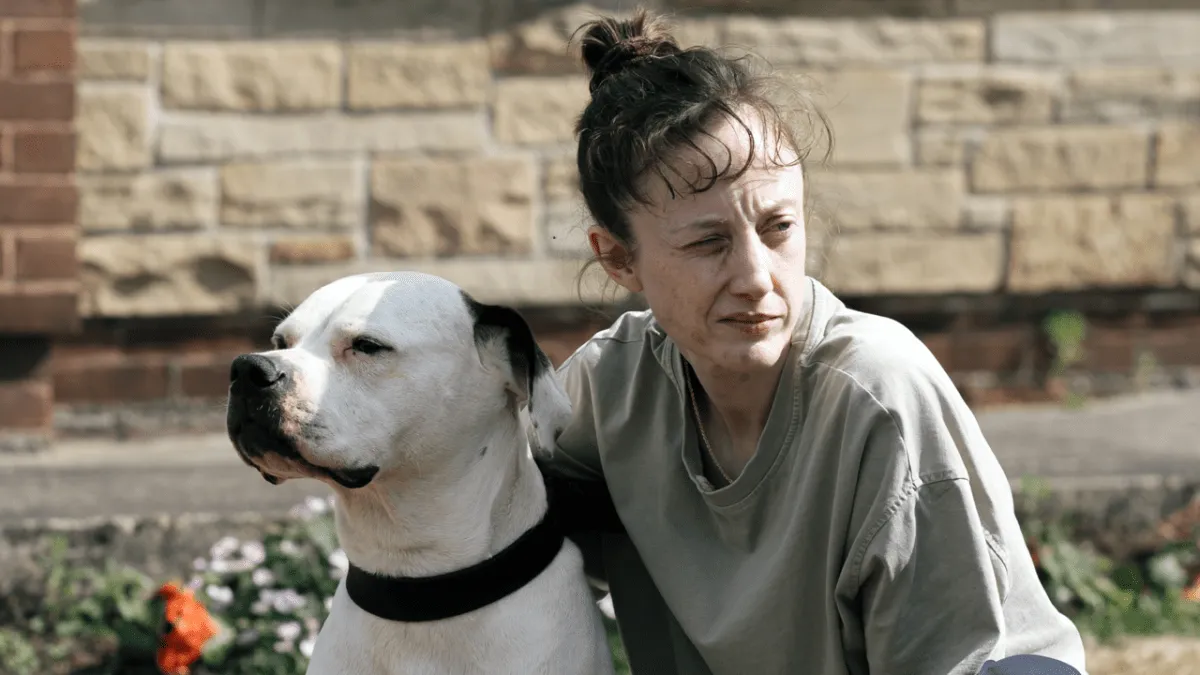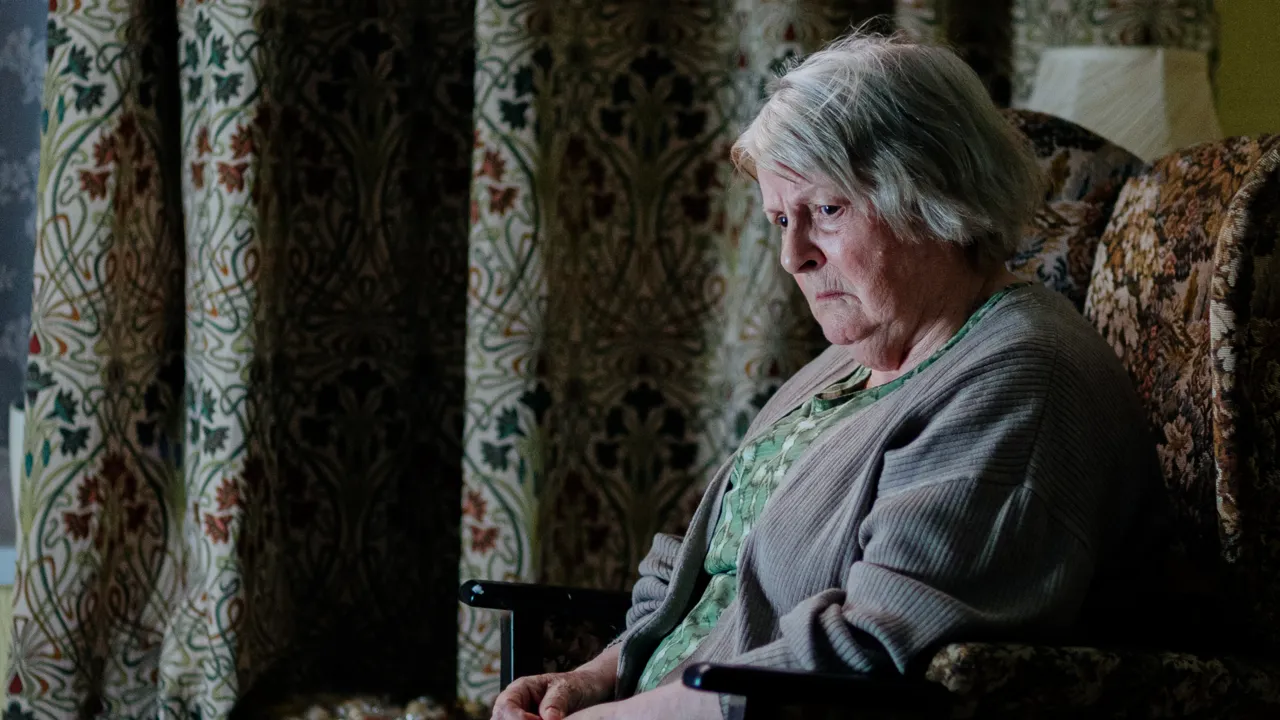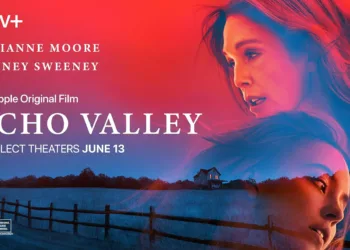In the quiet landscape of suburban Britain, where identical bungalows stand shoulder to shoulder, director Paul Andrew Williams’ Dragonfly opens not with a bang, but with a profound silence. We meet two women living lives that are mirror images of solitude.
In one home is Elsie (Brenda Blethyn), an elderly widow whose days are measured by the impersonal visits of agency nurses. She’s not a person; she’s a checklist of duties—bathed, fed, left alone. Her existence has become a sterile routine. Next door, separated by a single wall, lives Colleen (Andrea Riseborough), a much younger woman whose isolation is more feral.
Guarded and reclusive, her only real companion is Sabre, her enormous bull terrier. She is a ghost in her own life, a fringe dweller in a world that has largely forgotten her. The film lets us sit in their loneliness until a simple offer to fetch groceries becomes the first thread connecting two disparate, desperate worlds.
An Unorthodox System of Care
What begins as a small kindness soon blossoms into a new routine, one with far more warmth than the sterile system it replaces. The film’s early pacing is masterful, allowing the bond between Elsie and Colleen to form organically. Williams presents a sharp critique of institutional elder care, showing it as a process that strips away dignity.
The paid nurses barely know Elsie’s name; for them, she is a task to be completed. Colleen, in contrast, offers something far more valuable: her presence. She steps into the void, and her personal, if sometimes abrasive, attention breathes new life into Elsie. The older woman’s spirit seems to visibly lift. There is a touching moment when Colleen visits Elsie’s home and remarks, “It’s exactly like mine, just the other way round.”
The line perfectly captures their situation—two similar souls at different ends of life’s journey, finding a reflection in one another. This fragile ecosystem is disrupted by the arrival of Elsie’s son, John (Jason Watkins), a man whose concern is filtered through a thick lens of suspicion, setting the stage for conflict.
The Engine of Ambiguity
The film is anchored by two phenomenal performances that supply its emotional weight and its unbearable tension. Brenda Blethyn gives Elsie a quiet dignity, and we feel her relief as genuine human connection re-enters her life.
But it is Andrea Riseborough who is the story’s unstable core. Her portrayal of Colleen is a raw, live-wire act of profound hurt and guardedness. In a devastating, wordless scene, she attempts to follow a makeup tutorial, only to break down before the mirror, unable to see the promised confidence in her own reflection. It’s a moment that lays bare her deep self-loathing.
This performance keeps the audience perpetually off-balance. Is Colleen a savior, a predator, or simply a damaged person seeking purpose? The film shrewdly plants seeds of doubt—she gains access to Elsie’s bank card and PIN—making us question her motives, and then question ourselves for doing so. All the while, her dog Sabre is a silent, hulking presence, a source of comfort for her but a symbol of latent danger for everyone else.
A Failure in Narrative Design
For most of its runtime, Dragonfly is an exquisite, intimate drama. Then, in its final act, the film makes a choice that feels less like a narrative development and more like a betrayal. The story abandons its patient, character-driven focus and swerves violently into the territory of a grim, shocking thriller.
This tonal whiplash is triggered by the interference of Elsie’s son, whose actions shatter the delicate balance of the central relationship. The shift is jarring and feels entirely unearned, as if the director lost faith in the quiet power of his own story.
What was a thoughtful exploration of loneliness, neglect, and found family is incinerated for a shocking climax that feels designed to provoke rather than to resonate. It’s a terrible shame, because the film spends so much time carefully building characters we care about, only to discard that emotional investment for a bleak finale that extinguishes all the light it had so carefully cultivated.
Dragonfly is currently in post-production and is being represented by Alliance Media Partners. No release date, distribution platform, or additional technical credits (cinematographer, editor, composer) have been officially announced yet
Full Credits
Director: Paul Andrew Williams
Writer: Paul Andrew Williams
Producers: Dominic Tighe, Mare‑Elena Dyche
Cast: Andrea Riseborough, Jason Watkins, Brenda Blethyn, Sandra Huggett
The Review
Dragonfly
Dragonfly is a film of two halves. The first is a masterpiece of quiet desperation, powered by breathtaking performances from Andrea Riseborough and Brenda Blethyn. It thoughtfully explores loneliness and connection with immense grace. However, a jarring and cruel final act betrays its own careful construction, leaving a bitter aftertaste. It’s a powerful, potent film that ultimately stumbles just before the finish line, making its unfulfilled promise all the more heartbreaking.
PROS
- Phenomenal, layered lead performances from Andrea Riseborough and Brenda Blethyn.
- A deeply moving and patient exploration of loneliness and the failures of elder care.
- Masterful build-up of tension and ambiguity in the central relationship.
- A powerful and emotionally resonant first two-thirds.
CONS
- An abrupt and jarring tonal shift into a violent thriller in the final act.
- The shocking conclusion feels unearned and undermines the film's established themes.
- Betrays the careful character development built throughout the story.



















































